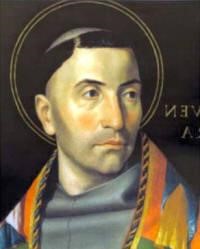On the Feast
of the Sacred Heart of Jesus: With You is the Source of Light and Life
By Saint Bonaventure
In this excerpt from Saint Bonaventure's work entitled "With You is the Source of Life," the great saint reflects on the meaning of the blood and water which flowed from the side of the crucified Jesus Christ, the living water of sacramental grace coming from the loving heart of our precious Savior. His comments are in part a commentary on several lines of Psalm 36:5-12, used in the office of the feast: "Your love, Lord, reaches to Heaven, your truth to the skies . . . In you is the source of life, and in your light, we see the light." This excerpt appears in the Roman Office of Readings for the Feast of the Sacred Heart of Jesus, celebrated on the third Friday after the Feast of Pentecost.
 "Take
thought now, redeemed man, and consider how great and worthy is he who hangs on
the cross for you. His death brings the dead to life, but at his passing, Heaven
and earth are plunged into mourning, and hard rocks are split asunder.
"Take
thought now, redeemed man, and consider how great and worthy is he who hangs on
the cross for you. His death brings the dead to life, but at his passing, Heaven
and earth are plunged into mourning, and hard rocks are split asunder.
It was a divine decree that permitted one of the soldiers to open his sacred side with a lance. This was done so that the Church might be formed from the side of Christ as he slept the sleep of death on the cross, and so that the Scripture might be fulfilled: They shall look on him whom they pierced.' The blood and water which poured out at that moment were the price of our salvation. Flowing from the secret abyss of our Lord's heart as from a fountain, this stream gave the sacraments of the Church the power to confer the life of grace, while for those already living in Christ, it became a spring of living water welling up to life everlasting.
Arise, then, beloved of Christ! Imitate the dove that nests in a hole in the cliff,' keeping watch at the entrance like the sparrow that finds a home.' There like the turtledove, hide your little ones, the fruit of your chaste love. Press your lips to the fountain, draw water from the wells of your Savior; for this is the spring flowing out of the middle of paradise, dividing into four rivers,' inundating devout hearts, watering the whole earth and making it fertile.
Run with eager desire to this source of life and light, all you who are vowed to God's service. Come, whoever you may be, and cry out to him with all the strength of your heart. O indescribable beauty of the Most High God and purest radiance of eternal light! Life that gives all life, light that is the source of every other light, preserving in everlasting splendor the myriad flames that have shone before the throne of your divinity from the dawn of time! Eternal and inaccessible fountain, clear and sweet stream flowing from a hidden spring, unseen by mortal eye! None can fathom your depths nor survey your boundaries; none can measure your breadth, nothing can sully your purity. From you flows the river which gladdens the city of God' and makes us cry out with joy and thanksgiving in hymns of praise to you, for we know by our own experience that with you is the source of life, and in your light we see light.'" [From the Non-Biblical readings for Ordinary Time from the Liturgy of the Hours].
Honored by the Church as the "Seraphic Doctor," Saint Bonaventure was born Giovanni di Fidanza in the region of Tuscany, Italy circa 1217/1221. He received his name from Saint Francis of Assisi who, when praying for young Giovanni's healing from a severe illness, suddenly received a divine revelation of the boy's future greatness in the service of the Church and enthusiastically cried out "O buna ventura" "O good fortune!
When he was 22 years old (about 20 years after the death of Saint Francis), Giovanni entered the Franciscan order founded by Saint Francis of Assisi. After he made his vows, he was sent to Paris to continue his studies. While studying in Paris, he became the intimate friend of the great St. Thomas Aquinas, where both men received a Doctor of Theology degree.
At thirty-five, St. Bonaventure was chosen to be the General of the Franciscan Order and wrote a biography on the life of the Order's founder, St. Francis of Assisi, along with many passionately beautiful treatises on the Catholic faith. He turned down many honors but was finally obliged, at the urging of Pope Gregory X, to accept the office of Cardinal and Bishop of Albano. He died while assisting at the Second Council of Lyons on July 15, 1274. The Church remembers this great saint on his feast day every July 15th, the anniversary of his entrance into the heavenly kingdom.
Michal E Hunt, Copyright © 2007; Agape Bible Study. Permissions All Rights Reserved.
